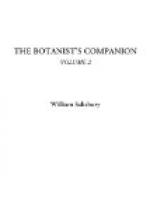Our Hellebore is at present looked upon principally as an alterative, and in this light is frequently employed, in small doses, for attenuating viscid humours, promoting the uterine and urinary discharges, and opening inveterate obstructions of the remoter glands: it often proves a very powerful emmenagogue in plethoric habits, where steel is ineffectual or improper. An extract made from this root with water, is one of the mildest, and for the purposes of a cathartic the most effectual preparation of it: this operates sufficiently, without occasioning the irritation which the pure resin is accompanied with. A tincture drawn with proof-spirit contains the whole virtue of the Hellebore, and seems to be one of the best preparations of it: this tincture, and the extract, used to be kept in the shops. The College of Edinburgh used to make this root an ingredient in the purging cephalic tincture, and compound tincture of jalap; and its extract, in the purging deobstruent pills, gamboge pills, the laxative mercurial pills, and the compound cathartic extract.—Lewis’s Mat. Med.
Similar Plant.—Helleborus viridis.
214. Helleborus foetidus. BEARSFOOT. Leaves. L.—The root is a strong cathartic; it destroys worms, and is recommended in different species of mania. It is commonly substituted for that of the Helleborus viridis, which is a more dangerous medicine. Hill’s Herbal, p. 32. Great care ought to be used in the administering this plant: many instances of its dreadful effects are related. (See Poisonous Plants.)
Similar Plant.—Helleborus viridis.
215. Hordeum distichon. Pearl barley. Seeds. L. E.—Barley, in its several states, is more cooling, less glutionous, and less nutritious than wheat or oats; among the ancients, decoctions of it were the principal aliment, and medicine, in acute diseases. The London College direct a decoction of pearl barley; and both the London and Edinburgh make common barley an ingredient in the pectoral decoction.
216. Humulus Lupulus. The hop.—The flowers and seed-vessels are used in gout and rheumatism, under the form of infusion in boiling-water. The powder formed into an ointment with lard, is said to ease the pain of open cancer. A pillow stuffed with hops is an old and successful mode of procuring sleep in the watchfulness of delirious fever.
217. Hyoscyamus niger. Henbane. Leaves and Seeds. L. E.—Henbane is a strong narcotic poison, and many instances of its deleterious effects are recorded by different authors; from which it appears, that any part of the plant, when taken in sufficient quantity, is capable of producing very dangerous and terrible symptoms. It is however much employed in the present days as an anodyne. Dr. Withering found it of great advantage in a case of difficult deglutition. Stoerck and some others recommend this extract in the dose of one grain or two; but Dr. Cullen observes, that he seldom discovered its anodyne effects till he had proceeded to doses of eight or ten grains, and sometimes to fifteen and even to twenty. The leaves of Henbane are said to have been applied externally with advantage, in the way of poultice, to resolve scirrhous tumours, and to remove some pains of the rheumatic and arthritic kind.




